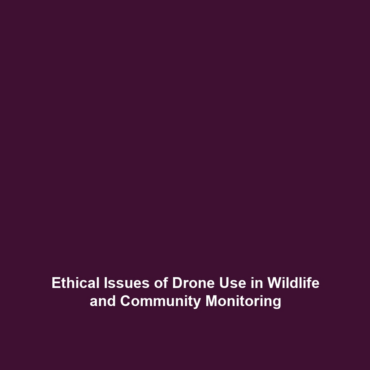Ethical Concerns Surrounding the Use of Drones for Monitoring Wildlife and Human Communities
The integration of drones in science, specifically for monitoring wildlife and human communities, raises significant ethical concerns. As drones become increasingly utilized in ecological studies, public health assessments, and community infrastructure evaluations, it is crucial to address the implications of their deployment on privacy, consent, and environmental impacts. Understanding these ethical challenges is essential for advancing responsible practices in the application of drones for ecological and humanitarian purposes.
Key Concepts of Ethical Concerns in Drones
Within the realm of drones in science, several key concepts emerge when discussing ethical concerns:
- Privacy and Surveillance: The potential for intrusive monitoring of both wildlife and human activities without consent.
- Consent and Community Engagement: The need for obtaining permission from communities that could be affected by drone surveillance.
- Environmental Impact: Assessing the sustainability of using drones, particularly in sensitive ecosystems.
- Data Security: Ensuring that collected data is handled responsibly and securely to protect the rights of individuals and communities.
Applications and Real-World Uses
Exploring the applications of ethical considerations in the use of drones reveals important insights:
- Wildlife Conservation: Drones are employed for tracking endangered species while ensuring minimal disturbance to their natural habitats.
- Disaster Response: In humanitarian aid, drones help assess damage and coordinate relief efforts, yet ethical considerations regarding affected populations are paramount.
- Urban Planning: Monitoring urban developments involves assessing human communities, raising issues of consent and surveillance.
These examples illustrate how ethical concerns in monitoring wildlife and human communities are vital aspects of drones in science.
Current Challenges in Ethical Drone Monitoring
Despite the potential benefits, significant challenges arise in the ethical study and application of drone technology. These include:
- Regulatory Gaps: Lack of comprehensive laws governing drone usage related to privacy rights.
- Public Perception: Concerns about trust and acceptance within communities being monitored.
- Technological Limitations: Inherent biases in AI and data collection processes may lead to misinterpretations of collected information.
Future Research and Innovations
Looking ahead, several innovations are on the horizon that could change the landscape of ethical considerations in drone usage:
- Improved Legislation: Efforts to create frameworks specifically tailored to address drone ethics.
- Enhanced Drone Technology: Development of drones with built-in privacy features to anonymize data collection.
- Community-Centric Approaches: Engaging communities in the planning and implementation stages of drone monitoring projects.
Conclusion
In conclusion, the ethical concerns surrounding the use of drones for monitoring wildlife and human communities are critical considerations in the field of drones in science. As drone technology continues to advance, it is imperative for researchers and practitioners to prioritize ethical standards and community engagement. For further reading, explore related topics on drones and privacy or the use of drones in wildlife conservation.
